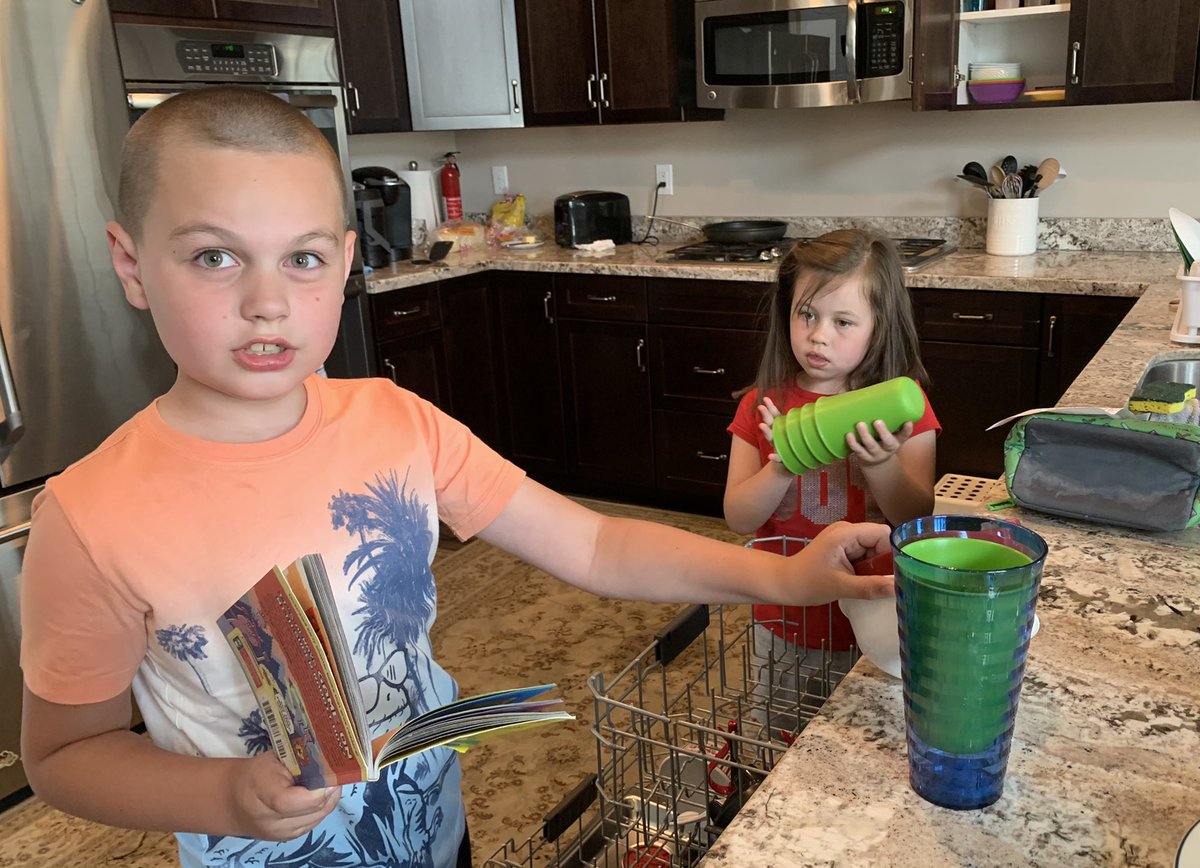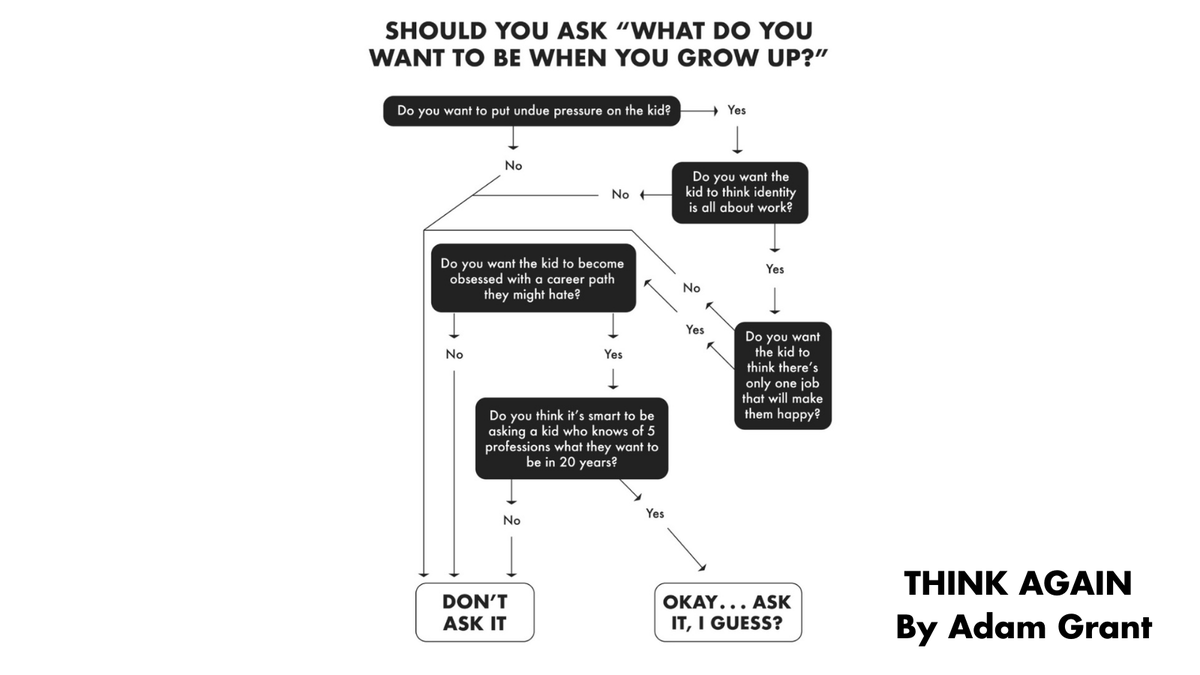Atomic Habits taught me to think of daily routines as systems we can intentionally design. I love our After School Jobs time each day. @JamesClear pic.twitter.com/AGwO8oPuIv


Imagine you are writing a letter to your son or daughter. What is one lesson or idea that you don’t think many parents would mention, but you consider important to understand?
Lego blocks. You can use legos to build whatever you want. You don't have to follow the instructions—but most people do. First principles thinking is when you break everything down to the fundamental building blocks and then decide what you want to create. twitter.com/Harris_Bryan/s…
The common narrative is that kids learn faster than adults, but I’m not sure the difference is meaningful. Watch any toddler. They spend nearly every waking minute on the edge of their ability and then sleep 12 hours. If adults acted similarly they would be learning machines.
Studies shows that when we go to sleep, our brain focuses on the most salient problem it was recently trying to solve. So if we want kids to retain what they “study" better, they should play video games first, then study before going to 💤 Reverse the order: First 🎮 then 📚

Schools frame "success" as a straight line. This sets kids up for disappointment and unrealistic expectations. Success in real life looks more like a squiggly line, with multiple ups and downs: Invent, launch, reinvent, relaunch. Start over. Repeat again and again. ➿ > ➖

Finding work that you enjoy is a shortcut to achieving your desired outcomes.

How can we help kids become more independent-minded and why does it matter? 3 ideas from @paulg that apply to kids 👇🏼

The only sustainable answer to the challenge we face in education today: Diversity of approaches.

Neat idea by @AdamMGrant: Don’t set rules, set values. Rules set limits that teach us to adopt a fixed view of the world. Values encourage us to internalize principles for ourselves. Instead of demanding attention, try talking to kids about why it’s important to listen.

Have a dilemma? Ask kids for advice. "I'm feeling nervous about my presentation tomorrow, any tips?" This shows we have confidence in them to handle these kinds of challenges. Next time they face a similar situation, they'll know that they can rely on themselves.

For moral behaviors, try nouns > verbs. Instead of “that was so generous” try “YOU are so generous” "When our actions become a reflection of our character, we lean more heavily toward the moral and generous choices. Over time it can become part of us." — @AdamMGrant

Don’t praise the action. Praise the *character* behind the action. Research shows we get a 22-29% increase in how likely kids are to help if we say "thanks for being a helper" instead of "thanks for helping." Kids want to *earn* that identity. 👇🏼

We’re building the antidote for modern schooling. Here’s what makes Synthesis unique👇🏼

Kids contribute to team discussions in ways that feel authentic to them—be it leading, following, or disagreeing. They try and they fail, and their decisions are never perfect. But they surely get the chance to contribute to consequential decisions *in their own way.*

“If knowledge is power, knowing what we don’t know is wisdom” —@AdamMGrant Schools should teach kids to be curious, not afraid, about what they don’t know.

Because learning can and *should* feel like playing a fun game 🤸🏽♀️ Thanks for having me on your podcast @bzaidi pic.twitter.com/XZIboru60O

Who’s more impressive? The kid who knows the right answer, or the kid who doesn’t but figures it out?

Teach kids to think like fact-checkers: 1. Interrogate information instead of simply consuming it 🔎 2. Reject rank and popularity as a proxy for reliability 🙅🏽♀️ 3. Understand that the sender of information is often not its source 🤔 From Think Again by @AdamMGrant

Kids are natural creators. The problem is that schools limit their creativity by giving them a bunch of guidelines and parameters that tell them what the final product should look like. But when you see them in the right setting... 🤯🤯

Here’s what I’ve noticed: Kids who think like scientists are more comfortable admitting they were wrong. You hear them say things like “my strategy was bad, let me rethink my approach” or “my hypothesis was wrong, let me pivot” In scientists mode, kids gain mental agility.

In school we learn to search for reasons why we must be right. Perhaps we would learn more if we searched for reasons why we might be wrong and revise our views based on what we learn.

Our first simulations expose kids to “adult” concepts like revenue, profit, Dutch Auctions, wormholes, and headquarters, to name a few. We ask parents to keep an eye out for their kid’s improved vocabulary as they move through 🤸🏼♀️ youtu.be/3ge6W3NvWog

At Synthesis, we don’t design for content. We design for experience. What goes into the design of a Synthesis Experience? What are kids learning?👇🏼🧵

In school, we teach kids the importance of persevering and not giving up, and forget to remind them that it’s ok to quit sometimes. Grit is important, but don’t "persevere" if you’re going in the wrong direction.

“What do you wanna be when you grow up?” is one of the most useless questions an adult can ask a child. Here’s why👇🏼

A study showed that when 2nd & 3rd graders learned about “doing science” vs. “being a scientist” they were more excited about pursuing a career in science.🧪 "Becoming a scientist might seem out of reach, but the act of experimenting is something we can all try out” @AdamMGrant

So instead of asking kids what they want to be when they grow up, help them: ✨Brainstorm all the things they love to do ✨Talk about careers as something we do vs. someone we are ✨Understand that, sometimes, quitting is better than persevering in the wrong direction pic.twitter.com/bcttNPwwsB


3 ideas from @Kevin_Ashton: Creating is more monotony than adventure. It is early mornings and late nights: long hours doing work that will likely fail or be deleted—a process without progress that must be repeated daily for years. Beginning is hard, but continuing is harder.

In today's world, diversity of thought is more important than test scores. Schools teach you otherwise.














